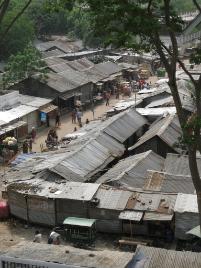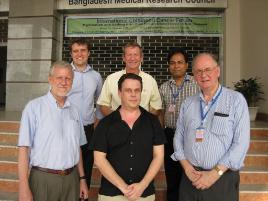Bangladesh's childhood cancer forum welcomes pyscho-social program
Published on 13 May, 2010
An invitation to represent Australia at the Childhood Cancer Forum in Bangladesh arose due to the worldwide reputation of CQUniversity's International Program of Psycho-Social Health Research* (IPP-SHR).
This event was initiated by the British Columbia Cancer Agency, Canada.
Attended by select experts from Australia, the UK, USA, Canada, Japan and Bangladesh*, the forum provided an opportunity to develop strategies aimed at bridging the substantial equity gap that affects the provision of treatment and care for children and their families facing paediatric cancer.
Childhood cancer is a major health threat in developing countries, including Bangladesh. Of the estimated 250,000 children that develop cancer each year, 80% are situated in developing countries.
Such children typically die without timely diagnosis or access to potentially lifesaving treatment. The mortality rate is in excess of 80%, with the majority dying within five years of developing cancer.
"This is in sharp contrast to the prognosis for children diagnosed with cancer in developed countries, where the survivorship rate for childhood cancer is currently 75 to 80%", says Mr Hamish Holewa, IPP-SHR Program Manager.
"The situation in Bangladesh is quite dire and is dependent upon resources. Cancer is an exotic and costly disease to treat, particularly compared with prevention and treatment processes for communicable diseases such as TB, malaria and diarrhoea.
"Major disparities in access to very limited services between rural and urban areas are also distinctively visible. Bangladesh does not have a childhood cancer registry to help inform planning decisions across the country.

Bangladesh has impoverished communities, adding to the challenge
"Whilst it is a noble goal to provide 100% treatment for childhood cancer, a two-pronged attack needs to occur to relive the burden of suffering.
"One arm of this is to lift treatment accessibility and rates through increased resources and implementation of standardized cost effective treatment protocols.
"The other is to develop an appropriate population and psycho-social approach, which provides greater understanding of how people seek treatment, why people don't seek treatment and why people drop out of treatment.
"Much work needs to be undertaken in early diagnosis and supportive and palliative care which can be implemented within the community," said Mr Holewa.
"Such programs can be low cost and reduce the burden of suffering associated with childhood cancer."
The forum elected 20 recommendations for reducing suffering associated with childhood cancer in Bangladesh. Recommendations included the establishment of a national cancer registry, reducing stigma, increasing timely diagnosis and developing a comparative economic study on treatment protocols.
The Childhood Cancer Forum is a substantial step to addressing the significant need for an international response to the challenges the Bangladesh health system faces in this area.
* IPP-SHR (CQUniversity) Program Manager Hamish Holewa (second from left in PHOTO) with Professor Charles Larson, Director Centre for International Child Health, British Columbia, Canada; Dr Stuart Peacock, Co-Director, British Columbia Cancer Agency, Canada; Professor O.B. Tim Eden University of Manchester, United Kingdom; Dr Paul Rogers, Medical Director & Division Head of Paediatric Oncology/Heamatology and BMT, C&W Hospital BC, Canada; and Dr Shameul Alam, Research Associate, Faculty Of Medicine, Kagawa University, Japan.


